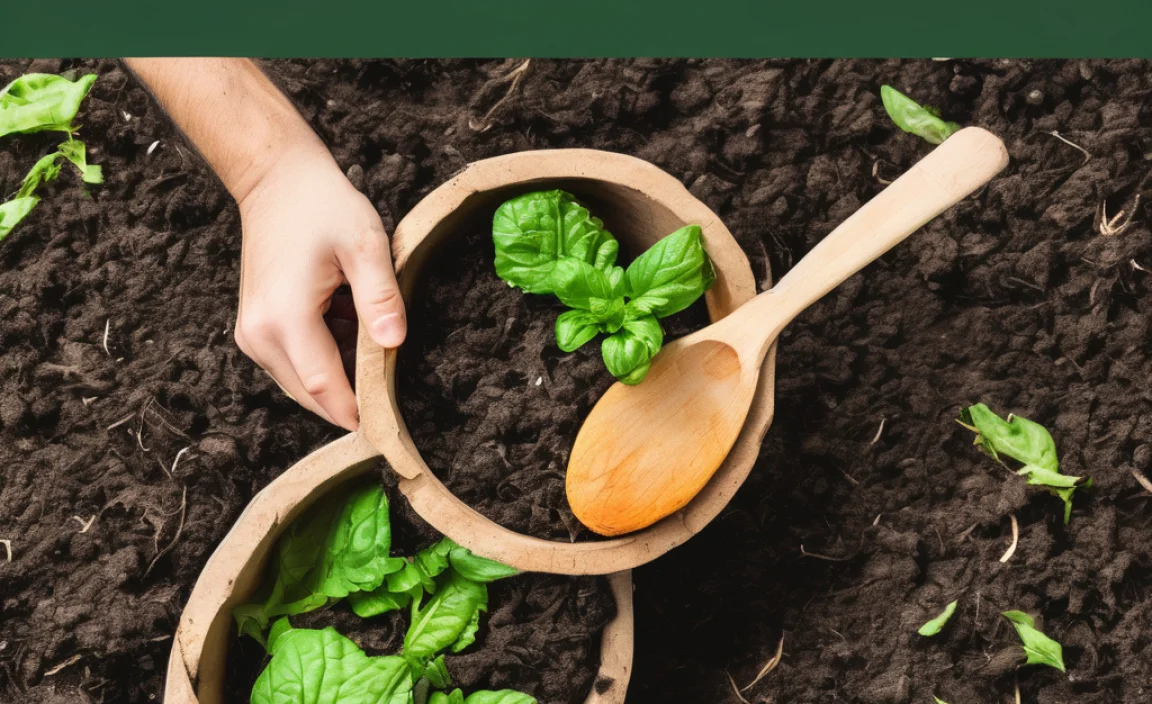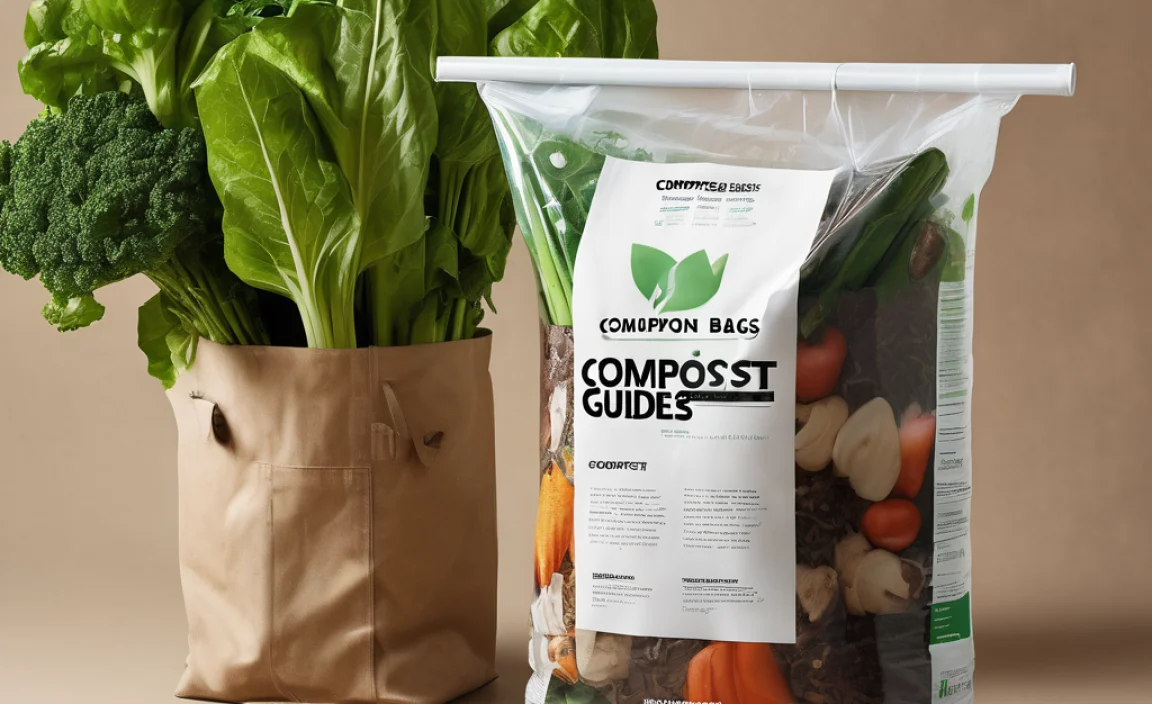Have you ever tossed away an apple core and felt a bit guilty? Imagine turning that waste into rich soil instead! Composting can seem tricky, but it’s just nature’s way of recycling. Many beginners make simple mistakes when starting. Want to learn how to avoid them? Let’s explore the world of composting together!
Key Takeaways
- Avoid putting dairy or meat in your compost.
- Balance green and brown materials correctly.
- Don’t forget to turn your compost regularly.
- Keep your compost pile moist, like a damp sponge.
- Common composting for beginners mistakes can delay the process.
Understanding Common Composting Mistakes
Composting can be a fun and rewarding process. But beginners often face challenges. One common mistake is adding the wrong items. Things like meat, dairy, and oily foods can attract pests. They can also make your compost smell bad. It’s important to know what to include and what to avoid.
- Include fruit and vegetable scraps.
- Add eggshells and coffee grounds.
- Avoid adding pet waste.
- Don’t add diseased plants.
- Include dried leaves and grass clippings.
Another mistake is not having the right balance. Compost needs a mix of green and brown materials. Green materials are rich in nitrogen. Brown materials are rich in carbon. Both are needed for compost to break down correctly. Ensuring a good balance helps create healthy soil.
Fun Fact or Stats : Did you know? About 30% of what we throw away is compostable!
What Are Green Materials?
Green materials are things like fruit scraps and coffee grounds. They are rich in nitrogen. Why is nitrogen important? It helps microbes break down materials into compost. But too much green can make compost smelly. It’s crucial to balance it with brown materials.
What Are Brown Materials?
Brown materials include dried leaves and paper. They are rich in carbon. Carbon gives energy to the microbes that break down the compost. Without enough brown materials, your compost might be too wet. This can slow down the process. Always aim for more browns than greens.
Balancing Green and Brown
Think of it like baking a cake. Too much flour or too many eggs can ruin it. The same goes for composting. You need the right mix of green and brown. Try to layer them like a sandwich. This ensures everything breaks down properly. Don’t worry if it’s not perfect. Nature is forgiving!
Importance of Aerating Your Compost
Imagine if you never turned off your favorite video game. Over time, the console might overheat. The same goes for your compost pile. It needs air to work efficiently. Turning or aerating your compost pile helps it break down faster. But many beginners forget this step.
- Turn your compost once a week.
- Use a garden fork to mix it up.
- Aerate to prevent bad smells.
- Aeration helps speed up the process.
- Compost needs oxygen to decompose.
Regular turning introduces oxygen into the pile. This oxygen helps tiny organisms do their work. If there’s no air, your pile might smell or attract unwanted pests. Remember, a well-aerated pile is a happy pile!
Fun Fact or Stats : Compost piles can reach up to 160°F, thanks to microbial activity!
What Happens Without Air?
Without air, composting slows down. The pile might start to smell bad. Bad smells attract pests. That’s why turning is so important. It keeps things moving and smelling fresh. Remember to turn your pile regularly. It’s a simple step that makes a big difference!
Tools for Aerating
There are many tools to help turn your compost. A garden fork is common. Compost aerators are also available. They make turning the pile easier. Choose a tool that feels comfortable for you. Experiment and see what works best. Remember, keeping the pile airy is key.
Signs of a Well-Aerated Compost
A well-aerated compost smells earthy. It doesn’t have a bad smell. It also breaks down quickly. If your compost is taking too long, try turning it more often. Make sure it’s not too dry or too wet. Balance is the key to success. With practice, you’ll get it just right!
Maintaining the Right Moisture Level
Moisture is like water for your plants. Compost needs it to thrive. But too much or too little can be a problem. Compost should be like a damp sponge. If it’s too dry, it won’t decompose. If it’s too wet, it might smell bad.
- Check the moisture level regularly.
- Add water if it’s too dry.
- Add dry materials if it’s too wet.
- Too much water can slow down composting.
- Keep a balance for best results.
Finding the right moisture balance takes practice. Start by checking your pile once a week. Squeeze a handful. If water drips, it’s too wet. If it crumbles, it’s too dry. Adjust as needed. Over time, you’ll know exactly what your pile needs.
Fun Fact or Stats : A compost pile is about 60% water by weight!
How to Check Moisture
Checking moisture is easy. Grab a handful of compost. Squeeze it in your hand. If it feels like a damp sponge, it’s good. If you see water, it’s too wet. If it feels dry and crumbly, add water. Regular checks keep your compost healthy.
The Role of Water in Composting
Water helps break down materials in the compost. Microbes need moisture to function. Without it, your compost stops breaking down. But too much water can drown the microbes. Balance is key. Keep your pile like a wrung-out sponge.
Adjusting Moisture Levels
To adjust moisture, add water or dry materials. If too wet, add straw or shredded paper. If too dry, sprinkle water over the pile. Adjust gradually. Too much change at once can disrupt the process. Make small changes and observe the results.
Avoiding Pests and Odors
Composting should be a pleasant experience. But sometimes, pests and smells can ruin it. Common composting for beginners mistakes often attract pests. This includes adding meat or dairy. These items create an unpleasant odor. Learn how to keep your compost pest-free and fresh.
- Avoid adding meat and dairy.
- Cover food scraps with browns.
- Turn compost regularly.
- Keep the right moisture level.
- Use a lid or cover for protection.
Pests are usually attracted by food smells. By covering scraps, you hide those smells. Regular turning and moisture checks also help. These steps keep your compost pile healthy and safe from pests. Stay vigilant and enjoy the process!
Fun Fact or Stats : Properly managed compost should not smell bad!
Common Pests to Watch Out For
Raccoons, mice, and flies love compost. They’re attracted to smelly food. Avoid adding anything they like. This includes meats and oils. Keep your pile covered. It discourages pests. Regularly check for signs of invasion. Stay ahead of the problem.
Dealing with Unpleasant Odors
Odors make composting unpleasant. They signal an imbalance. Check moisture and balance of materials. Too much green can cause smells. Add more brown materials to fix it. Regular turning helps air out the pile. A little attention prevents big problems.
Tools to Keep Pests Away
Use a compost bin with a lid. Lids deter pests. Choose bins with air holes. They provide ventilation while keeping pests out. A simple fence can also help. It’s about creating barriers. Keep pests out, while letting air in.
Understanding the Composting Process
Composting is like magic. It turns waste into rich soil. But how does it work? Tiny organisms break down plant material. They need air, water, and the right mix of materials. Understanding this helps avoid composting for beginners mistakes.
- Composting involves breaking down organic waste.
- Microbes need air and water to work.
- Balance of green and brown materials is crucial.
- Heat is a sign of active composting.
- Completed compost is dark and crumbly.
As you learn, you’ll see changes in your compost pile. It will heat up as it breaks down. Over time, it cools and becomes rich, dark soil. Understanding these stages helps you know what to expect. Enjoy watching nature at work!
Fun Fact or Stats : A well-managed compost pile can finish in just 3 months!
Role of Microbes in Composting
Microbes are tiny organisms. They break down waste into compost. They need food, water, and air. Think of them as tiny chefs preparing a feast. Without them, composting stops. Keep them happy for the best results.
Stages of Composting
Composting has stages. First, the pile heats up. This stage is fast. Then, it cools down as microbes slow. Finally, it matures. The compost becomes dark and crumbly. Each stage is important. Together, they create rich soil.
Signs of Finished Compost
Finished compost is dark and crumbly. It smells earthy, not bad. If you still see food scraps, it’s not ready. Finished compost feels light and fluffy. It’s a sign your hard work paid off. Use it in your garden to feed plants.
Conclusion
Composting is a rewarding journey. Avoiding common composting for beginners mistakes makes it easier. Remember to balance materials, aerate regularly, and maintain moisture. With practice, you’ll create rich soil for your garden. Enjoy the magic of turning waste into goodness!
FAQs
Question: What should I avoid putting in my compost?
Answer: Avoid adding meat, dairy, and oily foods. They attract pests and create bad smells. Stick to fruit and vegetable scraps, eggshells, and coffee grounds for best results. These help create healthy, rich compost.
Question: How often should I turn my compost pile?
Answer: Turn your compost pile at least once a week. This introduces air and speeds up decomposition. Regular turning helps avoid composting for beginners mistakes like bad smells or slow breakdown. Keep the process active and efficient.
Question: What is the right balance of green and brown materials?
Answer: Aim for more brown materials than green. Browns provide carbon, while greens provide nitrogen. A common mistake is having too much green, which can cause odors. Keep a balance to ensure efficient composting.
Question: Why is my compost pile not heating up?
Answer: If your pile isn’t heating, it might lack air, water, or the right balance of materials. Check moisture levels and ensure you have enough green materials. Aerate regularly to introduce air. Small adjustments can make a big difference.
Question: How do I know when my compost is ready?
Answer: Finished compost is dark and crumbly. It smells earthy and no longer resembles food scraps. If it’s light and fluffy, it’s ready for your garden. Trust your senses to determine readiness.
Question: Can pests in my compost be prevented?
Answer: Yes, pests can be prevented by avoiding common composting for beginners mistakes. Don’t add meat or dairy. Cover food scraps with brown materials and keep your pile moist. A lid or cover also helps deter pests.


